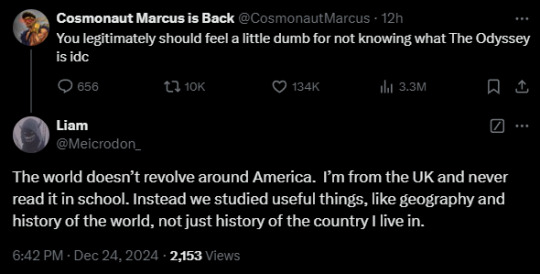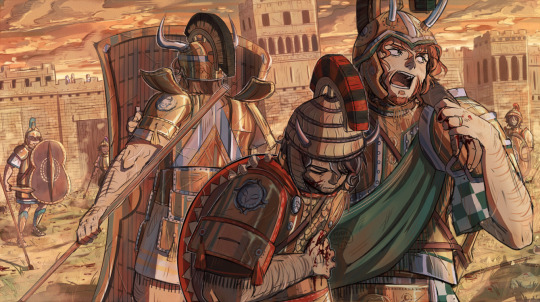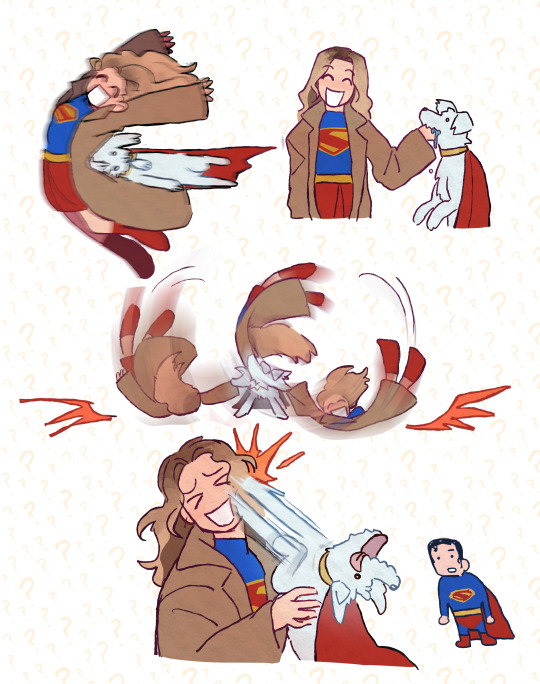23 | He/They | Transmasc | Aroace | Multifandom madness | Sometimes I post art
Last active 60 minutes ago
Don't wanna be here? Send us removal request.
Text
I want to talk about how deeply interesting The Odyssey is in terms of narrative structure and how that leads to so much complexity for our characters, particularly when we switch POV's and stop having an omnipotent narrator and instead have Odysseus telling us the story himself.
Like, particularly in book 9. We get this interesting push and pull of past and present, we are constantly reminded of the fact that everything that is being told to us has already happened, and it allows for some EXELLENT dramatic irony. Everything that Odysseus says to build up the encounter with Polyphemus in particular. The Odysseus in the past was ignorant to the info that the Odysseus of the present is giving his audience, which both acts as a way to ensure the listener will be on his side, but also creates tension. We KNOW what is going to happen to him and his crew, he himself told us that Polyphemus and the other Cyclopes are monstrous in nature, but this is all based in Odysseus' hindsight. With information he only has now, not at the time of these even event happening. As such we are waiting on the edge of our seats for the other shoe to drop, for him and in men in the context of the events actively occurring to become aware of what our present day Odysseus and what we the audience know. Which is why the moment Polyphemus brutally kills and eats Odysseus' men has the impact is does. We were building to the moment, waiting for the tension of the encounter to finally release.
This POV switch also means that, in the 4 books where we are hearing Odysseus' story from his own mouth, that we in a way get two of him. The him in the present, on the Phaeacians isle, and the him of the past, who is experiencing his journey. We can see the difference in him as a person in this section. His small nods to his own mistakes he made throughout the journey. We are seeing the man he was, and the man he is, simultaneously. We are seeing the war hero of Troy who came up with the brilliant plan that allowed them to breach Ilium's hallowed heights, and the man beaten down by time and the sea, a man who is more bitter and jaded than he was before, but who despite it all still desires for home, regardless of how he might have changed over the years. A man who against all odds was not broken by his journey.
And of course the reliability of Odysseus' account of his ten years lost at sea is up for debate, as no person is going to be completely unbiased in their retelling of events. I personally would not go so far as to call him an unreliable narrator, as much of what is said by him is backed up by our omnipotent narrator. But that doesn't mean there isn't any potential exaggeration, or that the way Odysseus described some of the events playing out would have been slightly different if told from a more objective point of view. And that makes the section even more interesting. What, if any, parts did he leave out, what if any, parts did he alter to make himself look more favorable to his audience? Why are some parts brushed over? Is it simply for the sake of time, a further reminder of how badly this man wishes to return home? Did nothing of note happen during the parts he glossed over? Is he ashamed of what happened? Or are those parts that he does not wish to remember?
And of course I have my own personal opinions/interpretations on the matter, but the important part is that we are getting this deeply introspective look into his character from his own mouth that informs the audience of who he is now, at the end of his journey, by showing us who he was throughout it. And we will never truly know to the degree in which said introspection is factual, due to the way that this part of the epic is told. But that just makes it all the more interesting. We are getting how Odysseus believes he has changed throughout the years, we are hearing from him what he believes what his mistakes were, and what the mistakes of his crew were. Because while he didn't wholesale make up his journey home, that does not mean that we don't have room for interpretation for how accurate or inaccurate (weather intentionally or otherwise) Odysseus' description of his journey home was.
#the odyssey#odysseus#tagamemnon#literary analysis#is this all incredibly obvious stuff?#I mean probably#but I like yapping so
10 notes
·
View notes
Text








Sketchy comic of Telemachus and Odysseus bonding lol
6K notes
·
View notes
Text
Thinking of Odysseus as king of Ithaca
Thinking of Odysseus taking part in raising the children of his town. Putting them on his lap, holding the cups for them and giving them bits of meat and bread
Thinking of Odysseus hosting any stranger and suppliant at his door and being generous with his guest gifts
Thinking of Odysseus' piety to the gods, being diligent in his sacrifices and following the gods laws and putting himself second to those laws
Thinking of Odysseus' love for his home country - the small island and the surroundings, the rocky ground not suited to keep horses, but perfect for goats, thinking of him yearning so much for his home that on Ogygia all he wanted to see was the smoke rising from his home
Thinking of Odysseus' love for his wife, through 20 years, his equal, who loves him back just as fiercely and loyal
Thinking of Odysseus' love for his son, whom he went to war for and by whose name he identifies himself with, how he cries upon seeing him again after 20 years
Thinking of Odysseus' love for his parents who extend the same love back to him
Thinking of Odysseus curiosity for learning more about the world
Thinking of Odysseus being deeply loved by so many of his comrades at war and crew
Thinking of how the fandom decided to villanize him into the evil, pathological liar that constantly abuses and manipulates the people close to him
He does bad, he's prideful, he uses his wits and strategies to get what he needs and his empathy doesnt always extend to those of lower rank or to an opposing side, or those standing in his way, willing to do things to protect himself
But its not the core of his personality
His core is a man who loves his home and honors the gods greatly, and he has many-layers of personality on top of that
He's not getting called the man of many wiles/ complicated man/man of twists and turns for no reason
Thinking of the lack of nuance he's being granted, either turning him too soft, or too evil
87 notes
·
View notes
Text
odysseus isn’t good because he’s “good,” he’s good because he gets kicked around like a soccer ball and barely succeeds in scraping and clawing his way home, but not even the gods manage to grind him down to nothing. every single day i feel like making some version of this post.
914 notes
·
View notes
Text
unpopular opinion maybe but people who unequivocally favor either the iliad or odyssey are missing the point a little i think. if you just have personal preferences that's fine of course but at the end of the day they come in a box set. death and endurance, tragedy and comedy, youth and maturity, inhale and exhale. narrative foils if you will. they represent complementing facets of humanity and to get the full experience you can't pick and choose
#100% agree!#like yes#i do personally prefer the odyssey#(i dont dislike war stories but I do find them a bit more tedious to read)#but that is not because the iliad is somehow a worse story!#it has so many themes on the glory and horror of war#and how no man who dies in war is truely faceless#and how those themes then go on to inform the themes of the odyssey#of the journey home after war#of the exhaustion and longing for home after war#and how (for odysseus)#that journey home will be just as long and arduous as war#they inform and feed into one another#so acting like one is somehow the “better” of the two completely misses the point
73 notes
·
View notes
Text
i lied put your clothes back on. we're going to talk about the constant objectification of odysseus in his own epic and speculate why homer sexualizes him far more than any female character in the poems
971 notes
·
View notes
Text
Begging people to let Penelope be human. Let her be vulnerable, let her be unstable, let her be affected by the suitors, affected by the grief of the last twenty years, let her need comfort.
*Cough* letherhavemorecharacterthanjustwifeandcaretaker *Cough* WHO SAID THAT???
...Must've been the wind.
332 notes
·
View notes
Text

meanwhile on Twitter
you could make the argument that it’s foolish that everyone in the world should know what the Odyssey is but if you’re from a western country that literally has Greek history stolen away in your museum then well, really a child left behind.
14K notes
·
View notes
Text
I’m all for making stuff up when putting mythology in your story but it’s also amazing how many people can’t tell the difference between a work of fiction and what people who practiced a religion or a folk tradition at the time actually believed.
4K notes
·
View notes
Text

God there is just something about this passage. The way Odysseus' longing for home is compared to hunger. The way it is compared to something so primal and instinctual, not something based in logical thought. And for it to be Odysseus, a man known for his intelligence, his mind teeming with clever plans and schemes, for that man to ruled by such a desire (at least in this moment) is so interesting! He is not (usually) a man commanded by instinct. And yet when it comes to this, he is unable to tear his eyes away from the setting sun, hunger racking his heart. Because even though we have seen him play to the logical part of his mind before in regards to his journey home, like when he said he would willingly stay a year with the Phaeacians when Alcinous said he wanted to lavish him with more gifts - it's better to return home with wealth than not, after all - this passage speaks to the direct contrary of moments like that. Odysseus can make those claims all he wants, but it does nothing to curb his hunger for home, and ultimately, he gives into it, all but willing the sun to set faster on the day so he can step aboard that ship bound for Ithaca.
Because it's not just that he wants to return to the shores of Ithaca, to Penelope, to Telemachus. He needs to. He needs it in the way he needs air to breath, water to drink and food to eat. He has been starving for his native land, his wife, his son for twenty long years, and finally, finally can see that feast in sight, and this passage paints that longing so well.
#hunger as a metaphor for love and longing my beloved#the odyssey#odysseus#tagamemnon#homeric epics#literary analysis#<kinda#really i'm just yapping
38 notes
·
View notes







